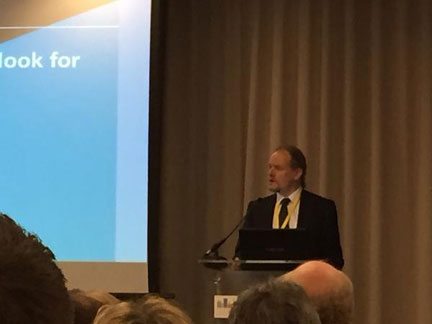 A re-energised and confident Leasehold Advisory Service held its LEASE annual conference 2015 in central London last Wednesday.
A re-energised and confident Leasehold Advisory Service held its LEASE annual conference 2015 in central London last Wednesday.
It was a gathering of some of the brightest – perhaps most socially engaged – of the players in the professional leasehold world: lawyers, surveyors, property tribunal judges, property managers.
For the third time – and it was a shameful omission before –leaseholders were allowed in for a “free” evening session. At last, they seem to be considered an important part of a LEASE annual conference.
The change of pace at the organisation is very largely due to the appointment of Roger Southam as chairman on January 1.
Like a vaudeville entertainer in winkle-pickers and bow tie, Mr Southam galvanised the audience with a fast-talking virtuoso performance that included extemporising dialogue, and US politician-style striding around the stage.
At one point, he pulled off an impromptu 15-minute talk as a stand-in for the housing minister, who failed to show at the last minute.
The message from Mr Southam, founder of property manager Chainbow as well as a leaseholder, could be reduced to: we are all in this together, so let’s pull together to make leasehold work better.
Awkward questions at this honeymoon stage of his appointment were largely avoided: the competing interests of freeholders and the professionals that they employ and leaseholders were smoothed over. Harmony was possible, and a cure-all was “better communication”.
Better communication had its limits, however.
“How many here think they are being ripped off by the property managers?” Mr Southam asked 400 leaseholders in the evening session, perhaps expecting a few malcontents.
Instead, a sea of hands immediately appeared, suggesting near unanimity among those present that they were, indeed, being ripped off.
Of course, any leaseholder attending a LEASE event is very likely to have a grievance to air, which marks a contrasts with the Competition and Markets Authority finding of fairly widespread contentment among leaseholders in its leasehold management report.
ARMA: We have lost members owing to ARMA-Q

Damian Greenish, of Pemberton greenish solicitors, chaired the main sessions, which began with Martin Perry, chairman of ARMA.
Applications to its new ARMA-Q regulatory scheme – which is now the benchmark for membership of the trade body – came in at the last minute before the January 1 deadline.
Mr Perry, who heads West of England Estates Management in Bath, said that ARMA-Q is “not a back-slapping exercise. We have lost some members because of it”.
Some property management companies either would not sign up, or did not qualify. His own company had to amend some business practices in order to do so (in later conversation this emerged related to the lack of formal management contracts with historic clients).
Although ARMA-Q is not the solution to all issues, Mr Perry argued that many of the CMA concerns about service charges, using reserve funds to off-set finances and links with service companies were addressed in the tougher regulations.
Mr Perry referred to the LKP session at the Commons on January 29, which he attended. “It was interesting blue skies thinking, but the chances of legislative change in the near future is very slim.”
True enough, with the election in spring.
CMA market study findings
Douglas Cooper, the project director of the leasehold management inquiry, went over the main findings of the report.
While “existing legislation and practices actually did quite a good job”, satisfaction was higher in RTM / RMC controlled blocks.
“Where the relationship between property manager and the leaseholder breaks down, the impact on leaseholders can be very significant,” he said. “There is a lot of suspicion and distrust of property management companies.”
The CMA estimated total revenue associated with service charges in England and Wales as between £2.3 billion and £3.5 billion.
There was the now obligatory reference to leaseholders’ ignorance: “Leaseholders often feel poorly informed and have a limited understanding of their liabilities when they purchase a leasehold property.”
Unmentioned, was the ignorance of others in the sector: until last autumn everyone was repeating the ludicrous figure of 2.5 million leasehold properties. It is now accepted that there are 4.1 million private leasehold properties.
However, LEASE is working on a simple information sheet for prospective buyers.
The CMA repeated – and has done at all presentations of its report – that the problems in leasehold were not confined to management companies that were not affiliated to the trade bodies. The complaints spread across all.
Transparency and communication – again – were highlighted, commissions of all kinds must be declared – including that of insurance to the freeholder – there should be full disclosure of corporate links with service companies.
The CMA seeks legislation “For new powers that would require the landlord to re-tender for a new property management company in circumstances where more than 50% of all leaseholders support re-tendering.”
It also recommended “alternative dispute resolution (either early neutral evaluation, mediation or other), separate from the current FTT process, for certain categories of complaint.”
LKP has long argued that ombudsmen schemes fulfil this role and that anything above £1,000 should be dealt with by the tribunal, whose own mediation service is showing a remarkably high take-up.
The First Tier Tribunal
Siobhan McGrath, president of the First Tier Tribunal (Property Chamber), gave an overview of the functions of the property tribunal, which is now handling 9,500 leasehold cases a year (11,000 cases of all varieties).
Again, there was a loaded emphasis on the property tribunal being a “no-cost service” – which will come as a surprise to the pensioners of Elim Court who are looking at approximately £25,000 costs so far for their failed RTM in the upper tribunal.
The tribunal may indeed be “no cost”, but what is the point of emphasising that given that landlords are allowed to levy legal costs in most leases?
Unless the tribunal prevents a landlord levying his costs, they descend on the leaseholders .
LKP had first hand experience of the “no cost” property tribunal when upmarket West India Quay wanted a recognised tenants’ association and the freeholder deployed a legal army costing £74,500 for an afternoon’s work.
Fortunately, this blatant gamesmanship in the property tribunal completely failed.
The material of other presentations at the LEASE annual conference will be addressed in subsequent articles.
Anthony Essien, LEASE’s Chief Executive, said of the LEASE annual conference 2015: “I was frankly honoured to see so many delegates join us for both the day and evening events. It just confirms to me that this is a unique and important event for everyone associated with leasehold property.”
Its report of the event is here





 Benjamin Mire fails to block RICS disciplinary investigation in the high court
Benjamin Mire fails to block RICS disciplinary investigation in the high court





















